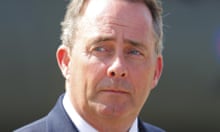The British military does not normally take kindly to comments from American counterparts about the state UK forces. Any such intervention is usually met, as it has been the case since at least the second world war, with a dismissive comment about American military prowess.
But British military chiefs will welcome the intervention at the weekend of the US army chief of staff, General Raymond Odierno, who told the Telegraph he was worried about a scaled-down British army.
With the Ministry of Defence almost certain to face deep cuts after the election, regardless of which party wins, Odierno said: “I would be lying to you if I did not say that I am very concerned about the GDP investment in the UK.”
Odierno’s comments are in line with what British military chiefs have been saying for months, both publicly and privately. Although there is an election still to be fought, the next chancellor, whether Labour or Conservative, will be looking for deep budget cuts. Defence, in contrast with protected budgets for health and overseas development, is among the most vulnerable for further reductions.
The British army, already coming to terms with a round of cuts reducing the army from 100,000 to just over 80,000, faces the prospect of being scaled down even further, to estimates of around 60,000.
Such cuts would mean the army would not be able to contribute to a US coalition as it did in Iraq and Afghanistan, which is what Odierno is concerned about. But this is part of a bigger debate to be had.
Should Britain start behaving like the small island state it is rather than maintaining the pretensions of being a significant world player? It is a reasonable debate for voters in May to decide they would rather see Britain play a smaller role in the world and shift more money from defence to welfare.
Britain at present is the fifth biggest spender on defence in the world. US spending is mammoth, then China, Saudi Arabia, Russia and the UK. France is not too far behind the UK, but then there is a big gap to Japan in seventh place, India, Germany, South Korea, Brazil and Italy, which spends about a third of the UK on defence.
In spite of such spending levels by the UK, its has become less visible on the international stage over the last few years, in part because of public hostility towards military intervention post-Iraq.
The contributions, at least in terms of ground troops, to recent confrontations, has been minimal: a symbolic 75 troops this year for the Ukraine-Russia war and a small force to Kurdistan and a handful to Baghdad for the fight against Islamic State.
David Cameron, in response to Odierno, said on Monday that Britain is still “a very strong partner for the US”. But that is a long way short of saying he will commit to maintaining defence spending at 2% of GDP and his Conservative colleagues such as former foreign secretary, William Hague, and former defence secretary, Liam Fox, know this, opening up another faultline in the Tory party.
“Odierno’s comments should not be read as criticism,” said Lukasz Kulesa, research director at the thinktank European Leadership Network. He saw it as a positive move that the US should seek to influence the debate on UK defence spending, pressing for it to be maintained at 2% of GDP.
Last week, the ELN published a report comparing defence spending round Europe since Nato members pledged at a summit in Wales last September to meet the goal of 2% of GDP spending. It found that only six of the 14 states they looked at would increase military spending: Latvia, Lithuania, Norway, Poland (all four worried about Russia), the Netherlands and Romania, but will still not meet the target this year. Six countries will in fact cut defence budgets and France will flatline.
As for the UK, although the British government lectured others at the Nato summit about failing to meet the target as it had done, the report noted that the UK will struggle to meet all its commitments. “On current planning assumptions, there appear to be insufficient funds allocated to the government’s defence procurement budget to cover all planned conventional and nuclear related equipment purchases,” it says.
Choices will have to be made. Two expensive aircraft carriers are on the way but will there be enough money to pay for enough planes to put on both of them? Will the UK government go ahead with the renewal of Trident in 2016 or delay a decision? Should money for conventional forces go for more tanks and artillery – though few in MoD seriously think there is much chance of conflict with Russia – or be diverted to unconventional ones such as special forces or psychological operations, better able to tackle threats such as Islamic State?
It is to answer questions like this that there will be another defence review, due to be published in 2016. The MoD, partly to ward off more defence cuts being imposed this year, is arguing that budget considerations this year should wait until after the spending review. It is not likely to happen.
The next chancellor can expect on taking office in Downing Street to be presented with a bleak set of Treasury figures, and defence will look like an attractive option for cuts. And to complicate already difficult decisions there could be arguments with coalition partners, say the Conservatives with the Democratic Unionists who have maintenance of 2% as a red line or Labour and the Scottish National Party, whose red line will be that Trident is not renewed.





Comments (…)
Sign in or create your Guardian account to join the discussion